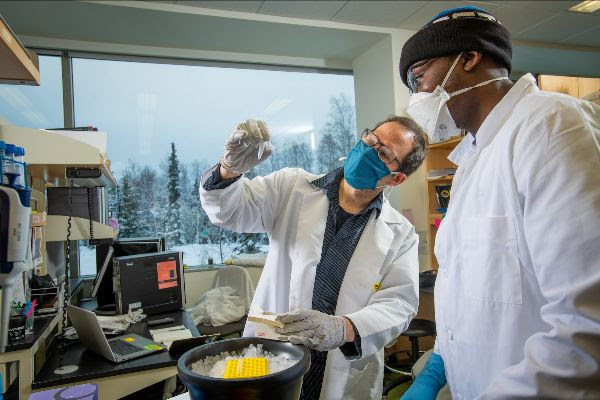Did You Know Alaska's Biomedical Research is Headquartered at UA?

Did you know that for the past two decades, a collaboration within the UA system has been improving health, reducing illness and disability, and building a pipeline of future biomedical and behavioral health researchers in Alaska?
(IDeA Network of Biomedical Research Excellence) joins UAF, UAA, and UAS with two
Alaska Native health providers, Southcentral Foundation and the Alaska Native Tribal
Health Consortium, to grow the state鈥檚 biomedical research infrastructure, attract
world-class researchers, support research unique to Alaska鈥檚 people, and increase
and diversify the students seeking careers in biomedical research in Alaska.
Since it was established in 2006, INBRE has invested nearly $80 million in research
infrastructure and projects in Alaska, and has positioned the UA system as a leader
in Arctic biomedical research.
Biomedical research is at the core of modern healthcare. Biomedical researchers study
pathogens, diagnose illnesses and test the effectiveness of potential cures. Yet prior
to INBRE, funding for biomedical research in Alaska lagged behind most states. The
INBRE program, a Congressional mandate funded by the National Institutes of Health,
addresses the profound geographic and cultural disparities in Alaska鈥檚 biomedical
research capacity. Alaska is one of to have an INBRE program, and the only one to partner with tribal health organizations.
Perhaps the most widely known research project supported by INBRE is seen on Alaska鈥檚 Covid-19 Dashboard.
Since the outbreak of the pandemic, INBRE-funded researchers have sequenced the SARS-CoV-2 circulating in Alaska to determine transmissibility and infection rates for appropriate public health responses.
Also unique to Alaska INBRE is its One Health research theme, which recognizes interconnections among the health of people, animals, and the environment to sustain healthy individuals, families, and communities during a time of rapid change in the northernmost state.
-
INBRE funds undergraduate and graduate student mentoring and across the system. gain valuable experience in designing, conducting and reporting biomedical research, and train in scientific method, scientific writing, and preparation of theses, manuscripts, reports, and presentations.
-
INBRE also provides direct research for faculty and health professionals working within its network of the UA system and partner Tribal health organizations.
-
INBRE provides core support for necessary for research to happen - such as research facilities, equipment, and data acquisition and analysis, including the of UAF鈥檚 Institute of Arctic Biology and the chemistry core at UAA. Because of INBRE investment, the UA system can offer unprecedented learning environments and experiences for students interested in entering the field.
In this , students and faculty talk about the impact INBRE has had on their education and work. Learn more about INBRE success stories .
Did You Know highlights the university's many successful programs through storytelling and data. Our goal is to educate readers about the university's role in improving lives and shaping the state's economy. These stories are shared on UA social media and posted on the .